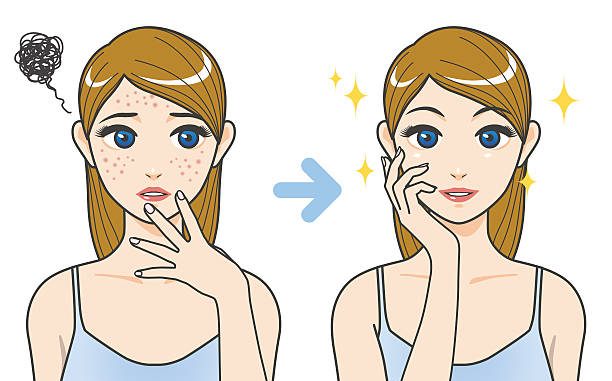
Cystic acne, known medically as acne vulgaris, is one of the worst types of acne around. The condition itself includes large cysts, pimples (both black heads and white heads), nodules and in many cases can result in scaly red skin and scarring. Unfortunately, the most common areas where cystic acne occurs are the face, chest and the back. This adds to the embarrassment felt by cystic acne sufferers. Even worse, the condition usually occurs in adolescence, which adds to the embarrassment. Sufferers often say they would do anything to try and get this condition under control in an effective and efficient manner.
While scarring is the most common side effect, the psychological problems associated with the condition can also not be overlooked. The condition can lead to social phobia, lowered self-esteem, depression, and in some cases even the thoughts of suicide. Because the condition occurs in adolescence when meny people are socially insecure, this adds to the severity of the psychological effects felt. It is for this reason, that a fast and professionally prescribed treatment is a necessity for most sufferers.
What Causes Cystic Acne
First let’s look at what causes cystic acne. While the condition can happen to anyone, it is most likely to be caused by the following key attributes:
- Overactive oil glands: The more oil your glands produce the more likely you are to get an outbreak. If your oil glands are over active then you are at greater risk of cystic acne.
- Dead skin cells: If you have an excess amount of dead skin cells particularly within the hair follicle area, you are also at greater risk of cystic acne.
- Bacteria: Some people have a larger number of acne-causing bacteria than others. If you do, you will again be more likely to suffer from cystic acne.
How To Treat Cystic Acne
As always, prevention is a lot better than cure. If you can avoid cystic acne starting, then the battle is solved. As can be seen from the causes above, there are several key attributes which lead to this type of acne. Two of these related to unclean skin. Based on this, the best ways to avoid cystic acne are as follows:
- Wash your face: You need to keep your face, and other affected areas of your body, very clean. Use a face or body cleaner at least twice a day to ensure that your face is clean.
- Don’t touch your face: Oily fingers can clog your pores. So where possible avoid touching your face. This will help to minimize, or eliminate cystic acne.
- Stay healthy: A healthy and balanced body that is hormonally balanced is less likely to suffer from cystic acne. So eat well, exercise regularly and keep all of your skin clean.
Now that you know how to avoid, or at the very least minimize, cystic acne, we can now look at the ways to treat. Unfortunately, because it is such a severe form of acne, cystic acne treatment is often harsh and can be invasive. The main treatments for cystic acne are provided below:
- First see your Doctor: It is worth noting that because cystic acne is a severe type of acne, most over the counter medications won’t work. As a first port of call, you will need to visit your Doctor. They will help prepare a plan of attack to get your acne under control. It is also important to note, that often the first few treatments don’t work. It really is a case of trial and error to find out works for the individual.
- Antibiotics: The most common form of treatment is an oral antibiotic. This helps to address the infection caused by cystic acne. Again, a range of different antibiotics can be tried, and the best one for the person will be used.
- Contraceptives: While this is only for women of course, it has been proven beneficial in terms of stabilising hormonal levels and reducing severe acne out breaks.
- Isotretinoin: Isotretinoin can be used to treat severe outbreaks of acne. While it is effective at treating acne there are a range of side effects. These include dryness of skin, fatigue, nausea and vomiting as well as even birth defects. Definitely worth weighting up all of the pros and cons before going down the path of using this drug.
- Cortisone injections: Cortisone can be injected into the affected area to reduce inflammation. This helps to minimize any scaring that may be caused as well. Other options should be considered before going down this path.
- Surgery: As a possible last resort surgery can also be considered. This is mainly done on a site specific basis, and involves a doctor making a small incision in the skin and removing all of the material inside the pimple. As with the cortisone injections, other options should be considered before going down this path.
Cystic acne is one of the most severe forms of acne. Because of its severe nature and associated damage to skin, there is a higher likelihood of permanent scars resulting from an outbreak. As with most things, prevention is better than cure. As detailed, in this article there are three ways to minimize the chances of outbreaks occurring. However, in some individuals outbreaks still will occur. Unfortunately, the treatment for cystic acne is quite harsh, and is often hit and miss. Therefore it is essential to meet with a Doctor first and develop up a plan of attack for how to get an outbreak under control. Possible treatments range from antibiotics, to injections to surgery. It is because of these severe treatments that a Doctor must be involved.
While there is no fast cure, the treatments will slowly help to get cystic acne under control. As well as monitoring the physical effects of the condition, it is also important for a Doctor to monitor the psychological condition of the patient. Cystic acne can cause depression and social isolation, and this must be monitored by a qualified professional.
